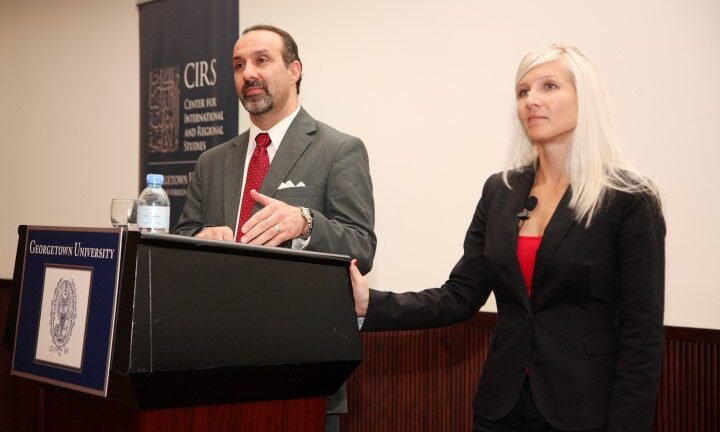Dialogue Series, Environmental Studies, Regional Studies
Mari Luomi Lectures on Unsustainability in Qatar and the GCC

Mari Luomi, one of the 2011-2012 CIRS Postdoctoral Fellows, gave the inaugural CIRS Monthly Dialogue lecture of the Fall 2011 semester. She lectured on the topic of “Natural Resources and Environmental Unsustainability in Qatar and the GCC” to an audience of academics, students, ambassadors, and interested members of the general public.
Luomi introduced the topic by noting that her research was geared towards suggesting a new conceptual framework for understanding the relationship between sustainability, political economy, and development in the states of the Gulf Cooperation Council (GCC). She defined the term “sustainability,” as “the use of natural resources in a way that allows for welfare for humans and the environment, presently and in the future.”
Outlining the main argument, Luomi said that “the Gulf monarchies’ dependence on fossil fuels, on fossil fuel revenues, and on social contracts based on these revenues produces unsustainability.” Major issues such as, economic growth, population increase, and pressures to diversify the economy in the region, all add tremendous pressure on economic, social, and environmental sustainability. In the GCC states in particular, the rentier set-up and the need to preserve the social contract between government and citizens is a unique factor leading to long-term unsustainability. She explained that “if we step back and look at the broader challenges that the GCC states are currently facing to the ‘business-as-usual’ ways of conducting their development,” it would be counter-productive to continue with the current model. “We must not forget,” Luomi said, “that we are living in a harsh, but, at the same time, very fragile environment.”
Indicators of unsustainability include greenhouse gas emissions, of which “the GCC produces 2.5% of global carbon emissions.” In Qatar, “we are looking at a society and economy that has the highest per capita emissions in the world,” Luomi said. A second indicator of unsustainability is the idea of an “ecological footprint,” which measures human consumption in relation to the Earth’s resources, with “the Qatari footprint representing six times the biological capacity of the world – so we are living six times over the world’s current capacity here on average,” she explained. In an attempt to tackle these high energy consumption and carbon emission rates, the Qatari government has made efforts to address the problem by viewing “environmental development” as one of the main pillars that form the Qatar National Vision 2030 plan.
Luomi concluded the lecture with suggestions regarding how the GCC states could encourage their societies to be more sustainable: “What we need for things to move onward is political will and determination.” She argued that it was necessary to have open debates on the environmental impacts of current natural resource consumption patterns as well as a well-grounded infrastructure for transmitting the message of sustainability through educational campaigns, recycling initiatives, and the encouragement of public transport, among other practical enterprises.
Luomi summed up the lecture by highlighting the simultaneous privilege and responsibility we have as residents and citizens of Qatar. Currently, there is an “illusion of plenty” that is incompatible with a sustainable future. She said, “here, economically, we have the possibility to continue consuming business-as-usual, but the moral question is, if we can, should we?”
Article by Suzi Mirgani, CIRS Publications Coordinator.
Mari Luomi is a Postdoctoral Fellow at the CIRS for the academic year 2011-2012. She holds a PhD in Middle Eastern Studies from Durham University. She has previously worked in various positions for the Middle East Project and the Programme in the International Politics of Natural Resources and the Environment of the Finnish Institute of International Affairs.